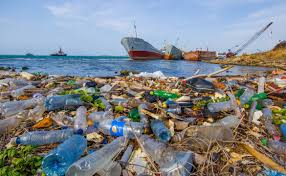The Shipping Correspondents Association of Nigeria (SCAN) has sounded the alarm on the escalating crisis of marine debris, emphasizing its multifaceted threat to the maritime industry, marine ecosystems, and coastal communities. Recognizing the urgency of the situation, SCAN is organizing a summit themed “Marine Debris: The Danger Ahead” to galvanize action and foster collaborative solutions. The summit aims to bring together key players in the maritime sector, environmental experts, policymakers, and relevant stakeholders to delve into the complex challenges posed by marine debris and chart a course towards effective mitigation strategies. The alarming statistic that millions of tonnes of plastic waste enter Nigerian oceans annually underscores the dire consequences for marine life, human health, and economic stability, making the summit a crucial platform for addressing this growing menace.
Marine debris, primarily composed of plastics, poses a significant threat to marine ecosystems. Plastics, due to their durability and slow degradation rate, persist in the marine environment for extended periods, causing entanglement, ingestion, and habitat destruction for marine organisms. The ingestion of plastic debris by marine life can lead to starvation, internal injuries, and the accumulation of toxins in the food chain, ultimately impacting human health through the consumption of contaminated seafood. Furthermore, the accumulation of marine debris on the seabed can smother benthic habitats, disrupting the delicate balance of marine ecosystems. The visual pollution caused by debris-strewn beaches and coastlines also has detrimental effects on tourism and coastal economies.
The economic implications of marine debris are far-reaching, affecting various sectors of the maritime industry. Shipping and navigation are hampered by debris entangling propellers and blocking intake pipes, leading to costly repairs and delays. Fishing gear lost or discarded at sea, known as “ghost gear,” continues to catch and kill marine life indiscriminately, depleting fish stocks and impacting the livelihoods of fishing communities. The tourism industry also suffers as polluted beaches and waters deter visitors, resulting in economic losses for coastal communities reliant on tourism revenue. The cost of cleaning up marine debris from beaches and coastlines further adds to the economic burden.
The 2025 SCAN summit, themed “Marine Debris: The Danger Ahead,” seeks to address this multifaceted crisis by bringing together stakeholders from various sectors. The summit will provide a platform for in-depth discussions on the sources and impacts of marine debris, the legal and regulatory frameworks governing marine pollution, and the best practices for prevention, mitigation, and cleanup. By fostering dialogue and collaboration among industry leaders, environmental experts, policymakers, and community representatives, the summit aims to develop comprehensive strategies to combat marine debris and promote sustainable practices within the maritime sector.
The summit will feature presentations, panel discussions, and interactive sessions focusing on key aspects of the marine debris challenge. Experts will share their knowledge and insights on the latest research findings, technological advancements, and policy initiatives related to marine debris management. Participants will have the opportunity to engage in discussions, share best practices, and explore innovative solutions for preventing marine pollution. The summit will also serve as a platform for networking and building partnerships among stakeholders, fostering a collaborative approach to tackling this complex issue.
SCAN, as an association dedicated to promoting sustainable practices within Nigeria’s maritime sector, recognizes its role in raising awareness and spearheading efforts to combat marine debris. The summit is a testament to SCAN’s commitment to addressing this pressing environmental and socioeconomic threat. By bringing together key stakeholders, the summit aims to create a unified front against marine debris and forge a path towards a cleaner, healthier, and more sustainable marine environment for present and future generations. The participation of government representatives, industry stakeholders, and environmental advocates is crucial for the success of this endeavor. The summit provides an opportunity to collectively devise comprehensive strategies and take decisive action to mitigate the dangers posed by marine debris and safeguard the invaluable resources of our oceans.














